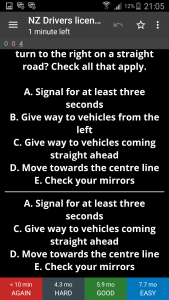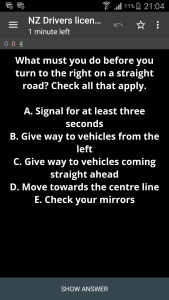In 2014 I decided to do a bit or work to finally get my New Zealand driver license. The first step towards this was passing the theory test which is a 35 question test given on computer. You have to get at least 32 questions right to pass.
After spending a bit of time looking at the roadcode book I decided to go with just learning the questions. I did this by:
- Buying some of the official practice exams
- Grabbing other questions for unofficial sites
- Entering some other questions manually from the books
I took all these questions and created a Anki Deck. Anki is some spaced repetition software that I use to learn things. I tell it to ask me a few new questions every day, if I get them wrong it asks me again tomorrow, if I get them right it asks me again next week. Gradually as I learn something it asks me less often (see the more technical explanation here)
A typical question on an Anki deck looks like these screenshots:

 The left on the left shows me being asked the question. Once I pick my answer I look at the actual answer (see rightmost screenshot)
The left on the left shows me being asked the question. Once I pick my answer I look at the actual answer (see rightmost screenshot)
If I get it wrong I get the card again in 10 minutes and depending on how easy I judged it if I got it right I’ll only see it again in months.
I ended up entering just on 400 questions and told Anki to give me 5 new cards every day plus whatever old ones I had to review. After a few months I had gone though all the questions and had a good feel for them. I also did some of the official practice exams.
Eventually in December 2014 I sat the exam and got 100 percent correct.
I’ll make my deck available at the link below. There are just over 400 cards in it, some with pictures. There are a few duplications but no errors as far as I am aware. They are current as of late 2014 (including the give-way rules change that year).
To use them you’ll need a copy of Anki and it is probably easiest to use the desktop edition to import the file and then use an Ankiweb account to Synchronize to a copy on your phone.
Download NZ Driver license Theory Anki Deck (2MB .apkg file)